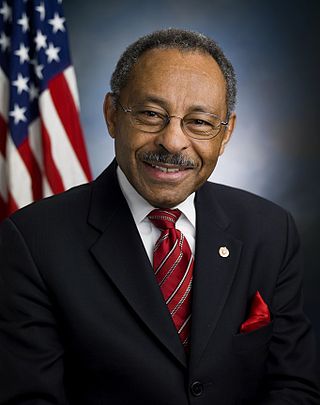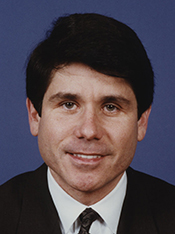Related Research Articles

The 1974 United States Senate elections were held on November 5, with the 34 seats of Class 3 contested in regular elections. They occurred in the wake of the Watergate scandal, Richard M. Nixon's resignation from the presidency, and Gerald Ford's subsequent pardon of Nixon. Economic issues, specifically inflation and stagnation, were also a factor that contributed to Republican losses. As an immediate result of the November 1974 elections, Democrats made a net gain of three seats from the Republicans, as they defeated Republican incumbents in Colorado and Kentucky and picked up open seats in Florida and Vermont, while Republicans won the open seat in Nevada. Following the elections, at the beginning of the 94th U.S. Congress, the Democratic caucus controlled 60 seats, and the Republican caucus controlled 38 seats.

William Scott Vare was an American politician from Pennsylvania who served as a Republican member of the United States House of Representatives for Pennsylvania's 1st congressional district from 1912 to 1927. He also served as a member of the Pennsylvania State Senate from the 1st Senatorial District from 1922 to 1923. He won election to the United States Senate for Pennsylvania in 1926 but was never seated and was eventually removed in 1929 due to allegations of corruption and voter fraud.

John Anthony Durkin was an American politician who served as a Democratic U.S. Senator from New Hampshire from 1975 until 1980.

Louis Crosby Wyman was an American politician and lawyer. He was a U.S. Representative and, for three days, a U.S. Senator from New Hampshire. This was one of the shortest tenures in Senate history. He was a member of the Republican Party.
James Brian Durkin is an American politician who served as a Republican member of the Illinois House of Representatives from 1995 to 2003 and again from 2006 to 2023. He served as the Minority Leader of the Illinois House of Representatives from 2013 to 2023.

Roland Wallace Burris is an American retired Democratic politician and attorney who served as Attorney General of Illinois from 1991 to 1995. In January 2009, he was appointed a United States Senator, succeeding Barack Obama, who resigned to become president of the United States. Burris held this position until November 2010, retiring from front-line politics shortly after.

The 2010 United States elections were held on Tuesday, November 2, 2010, in the middle of Democratic President Barack Obama's first term. Republicans ended unified Democratic control of Congress and the presidency by winning a majority in the House of Representatives and gained seats in the Senate despite Democrats holding Senate control.

The 2010 United States Senate elections in Illinois took place on November 2, 2010. There were two ballot items for the same seat: a general election, to fill the Class 3 seat beginning with the 112th United States Congress beginning on January 3, 2011, and a special election, to fill that seat for the final weeks of the 111th Congress. Roland Burris, who was appointed to fill the vacancy created by fellow Democrat Barack Obama's election to the presidency, did not run in either election.

In December 2008, then-Democratic Governor of Illinois Rod Blagojevich and his Chief of Staff John Harris were charged with corruption by federal prosecutor Patrick Fitzgerald. As a result, Blagojevich was impeached by the Illinois General Assembly and removed from office by the Illinois Senate in January 2009. The federal investigation continued after his removal from office, and he was indicted on corruption charges in April of that year. The jury found Blagojevich guilty of one charge of making false statements with a mistrial being declared on the other 23 counts due to a hung jury after 14 days of jury deliberation. On June 27, 2011, after a retrial, Blagojevich was found guilty of 17 charges, not guilty on one charge and the jury deadlocked after 10 days of deliberation on the two remaining charges. On December 7, 2011, Blagojevich was sentenced to 14 years in prison.

The 1984 United States Senate election in Illinois took place on November 6, 1984. Incumbent Republican Senator Charles H. Percy ran for re-election to a fourth term in the United States Senate. Senator Percy was opposed by Democratic nominee Paul Simon, who was a United States Congressman from Illinois's 22nd congressional district. The campaign between Percy and Simon was contentious and brutally fought, and ended up with Simon ousting Percy by fewer than 90,000 votes, which was, at the time, considered an upset. Incidentally, Percy's son-in-law Jay Rockefeller was elected Senator from West Virginia in the same election cycle.
The 1974–75 Elections for United States Senator in New Hampshire, first held November 5, 1974 and held again September 16, 1975, were part of the longest contested election for the U.S. Congress in United States history.

Elections were held in Illinois on Tuesday, November 2, 2010. Primary elections were held on February 2, 2010.

The 2014 United States elections were held on Tuesday, November 4, 2014, in the middle of Democratic President Barack Obama's second term. A typical six-year itch midterm election suffered by most second-term presidents, the Republican Party retained control of the House of Representatives and won control of the Senate, while furthering their gains in the governorships and state legislatures. Because of these Republican gains, the election was commonly cited as a "red wave" election.

A general election was held in the U.S. state of Illinois on November 4, 2014. All of Illinois' executive officers were up for election as well as a United States Senate seat, and all of Illinois' eighteen seats in the United States House of Representatives. Primary elections were held on March 18, 2014.

The 1926 United States Senate election in Illinois took place on November 2, 1926.

Kentucky state elections in 2018 were held on Tuesday, November 6, 2018, with the primary elections being held on May 22, 2018. These midterm elections occurred during the presidency of Republican Donald Trump and the governorship of Republican Matt Bevin, alongside other elections in the United States. All six of Kentucky's seats in the United States House of Representatives, nineteen of the 38 seats in the Kentucky State Senate, all 100 seats in the Kentucky House of Representatives, and one of the seven seats on the Kentucky Supreme Court were contested. Numerous county and local elections were also contested within the state.

These six off-year races featured special elections to the 113th United States Congress to fill vacancies due to resignations in the United States House of Representatives. Two were due to Congressmen taking seats in the United States Senate, one resigned to take jobs in the private sector, one resigned to take a job in the public sector, and one resigned due to an impending federal indictment regarding misuse of campaign funds.

Elections were held in Illinois on Tuesday, November 2, 1982.
References
- ↑ Morton Stavis, "A Century of Struggle for Black Enfranchisement in Mississippi: From the Civil War to the Congressional Challenge of 1965 -- and Beyond", 57 Mississippi Law Journal 591 (1987).
- ↑ J. Morgan Kousser, The Shaping of Southern Politics: Suffrage Restriction and the Establishment of the One-Party South, 1880-1910 (1974)
- ↑ https://www.citizensforethics.org/reports-investigations/crew-reports/past-14th-amendment-disqualifications/
- ↑ "U.S. Senate: The Election Case of William A. Clark of Montana (1900)". www.senate.gov. Retrieved December 5, 2017.
- ↑ Congressional Biography
- ↑ "Victor L. Berger | Encyclopedia of Milwaukee". emke.uwm.edu. Retrieved February 5, 2018.
- ↑ Frank Lloyd Wright Library, Frank L. Smith photographs, US Senate campaign brochure, accessed September 16, 2017
- ↑ Senate Historical Office, United States Senate. "The Election Case of Frank L. Smith of Illinois (1928)". senate.gov.
- ↑ "Congressional Record - Senate" (PDF). govinfo.gov. January 19, 1927. pp. 1911–1982.
- ↑ Beers, Paul B. (1980). Pennsylvania Politics Today and Yesterday: The Terrible Accommodation. Pennsylvania State University Press. ISBN 0-271-00238-7.
- ↑ "U.S. Senate: The Election Case of William B. Wilson vs. William S. Vare of Pennsylvania (1929)". www.senate.gov. Retrieved January 3, 2019.
- ↑ Weigley, Russell Frank (1982). Philadelphia: A 300 Year History . New York - London: WW Norton & Company. p. 584. ISBN 0-393-01610-2 . Retrieved January 5, 2019.
- ↑ "Closed for Business". www.digitalhistory.hsp.org. Retrieved January 2, 2019.
- ↑ "Burris v. White, Illinois Supreme Court, No. 107816" (PDF). January 9, 2009.
- ↑ Donning, Mike (January 5, 2009). "U.S. Senate officer rejects Burris' paperwork to fill seat". Chicago Tribune . Retrieved January 5, 2009.
- ↑ Espos, David (January 5, 2009). "Burris says he's senator — but Dems won't seat him". Yahoo! News. Associated Press. Archived from the original on January 8, 2009. Retrieved January 6, 2009.
- ↑ Mihalopoulos, Dan (January 10, 2009). "Supreme Court ruling gives Burris the Senate seat, attorney says". Chicago Tribune.
- ↑ Raju, Manu; Bresnahan, John (January 12, 2009). "Dems accept Burris into the Senate". Politico.
{{cite news}}: CS1 maint: multiple names: authors list (link) - ↑ "Senate Dems expect to seat Burris Thursday: Burris: 'I really never doubted that I would be seated'". NBC News. Microsoft. January 13, 2009. Retrieved January 14, 2009.
- ↑ Davis, Susan (January 13, 2009). "Roland Burris to Be Sworn In as Senator on Thursday". The Wall Street Journal . Dow Jones & Company, Inc. Retrieved January 14, 2009.
- ↑ Hulse, Carl (January 15, 2009). "Burris Is Sworn In". New York Times . Retrieved January 15, 2009.